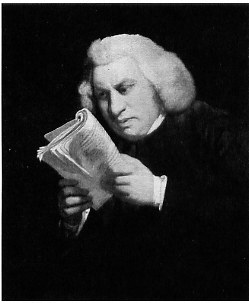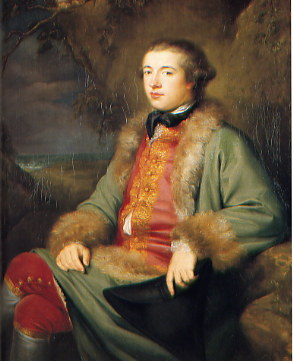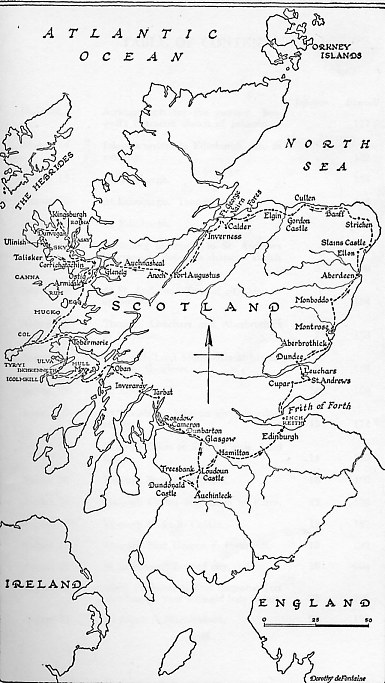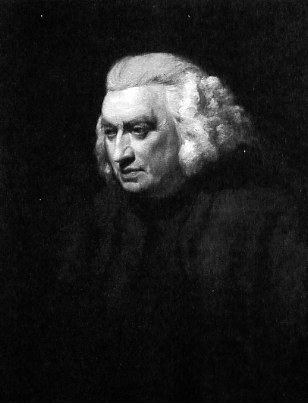
A slightly shorter version of this essay with most of the notes cut was published in the Johnsonian Newsletter, IV: 2, (Sept. 2004): 22-26.
By Ellen Moody

It was in early January 2001 that I proposed to the members of EighteenthCenturyNovels (a literary listserv) that we read together and discuss Boswell's The Life of Johnson. Around 10 people were enthusiastic and encouraged me to devise a schedule that those who wanted to join in could follow. The number of readers grew to more than 30, and the four-month discussion engaged about 15 active participants to finish the book and join in a second three-month round of Johnson's A Journey to the Western Islands and Boswell's The Journal of a Tour to the Hebrides.2
Readers of this Newsletter might surmize that 31 weeks of over 155 highly varied postings would be sheerly chaotic and too strongly reflect the particularistic motivations of different readers.3 In this case members responded to one another's leads,4 and produced a semi- continuous mostly performative epistolary novel on a connected set of themes.5 The link was readers' shared absorption in Johnson and Boswell's dissonant ideas and frequent sparring. Participants repeatedly noticed how much Boswell admired Johnson, and the affection and trust between him and Johnson, at the same time as they kept discussing the strains between them, especially as this emerged in Boswell's ways of presenting his and Johnson's attitudes towards, enactments and floutings of explicitly debated culturally-imposed goals and norms still (apparently) in effect today.6
The two men's relationship drew us through the books. In the very first posting, someone asked "Did Boswell realize how much of himself he put into the book; did anyone 'accuse' Boswell of creating a portrait of himself through Johnson?" Someone responded that nonetheless "There is almost enough information to find Johnson the man out of Boswell's admiring writing," and Boswell makes the "thought recur as [we] read how great a person Johnson was in Boswell's heart and mind." Boswell's text transgresses a common assumption that a biographer is supposed to repress his presence. Further into the Life, a third person wrote "I'm still strongly impressed by how much Boswell is present in this book. I don't ever remember reading a biography and being so aware of the presence of the author." The perceived problem went beyond not acknowledging that biography represents an interaction between the writer and his subject.7 When we reached 1773, a couple of members concurred with yet another member's outburst: "I must say that this voice of Boswell is really driving me mad. I don't want all his explanations, but I'm carefully reading them in case he has stuck in some nugget somewhere that I don't want to miss." One member who was reading Johnson's Life of Savage and Richard Holmes's Dr Johnson & Mr Savage, offered the "solution" that we should "try to look at the Johnson of this period not through Boswell's eyes, but through his connection with Savage." There was a woman who followed up Boswell's book with Hester Thrale's Anecdotes.
Bolder participants took sides. One woman took a strong dislike to Johnson for his "rudeness," "bullying, "insulting remarks," and "bigotry." Perceptive postings attempted to justify Johnson or explain that people were misunderstanding or overreacting. I seemed to be unusual in not finding Johnson alienating.8 Some list members later brought out Boswell's rivalry with Johnson, others the "natural" semi- hostility of between this "son-and-father" pair. When after Boswell and Johnson's trip to Scotland, someone characterized Boswell's letters to Johnson as "urgent" and quoted Boswell's complaint that Johnson had not responded to him, another member explained that Boswell was frustrated and angry: Johnson was proceeding to publish his travel book and was obstructing the publication of Boswell's book. This depressed Boswell.9 Several participants wrote that Johnson and others (e.g., Hester Thrale Piozzi) felt ambivalent about Boswell's continuous recording of private conversation.10
The conversation slipped away from this charged center -- though Johnson and Boswell's obsessive distress about death, Boswell's scene- making and jealousy of Mrs. Thrale, and the effect of the men reading one another's diaries were subjects canvassed more than once.11 It was decided to read the tours partly because that event had been "left out" of the Life and had changed the two men's relationship. When we read the tour books, members almost turned to the striking difference between their descriptions of the same event. Although one list member wrote about how Johnson's analysis of Highland mountain culture could help us understand what happened on September 11, 2001,12 most active participants seemed to prefer Boswell's anecdotal and autobiographical approach, and after comparisons of Johnson's style to modern guidebooks, postings about it as an ethnography, and a little discussion of Ossian, we were back to worrying questions like, why did Johnson grow so angry at Boswell when he walked on ahead of Johnson at Gleneg? Then, at the end of the trip in Glasgow, why did Johnson run to Boswell from some "teazing" men "for refuge"? Who was insecure here?
There were informative postings about Boswell's revisions. While we were reading the Life of Johnson, one woman agreed with someone else that the book "came to life" just as Boswell and Johnson met, but expressed her idea in this way:
"The concluding lines of the 1749 section refer to Johnson's pleasure in spending time backstage at the theatre, a pleasure he gave up, 'for the silk stockings and white bosoms of your actresses excite my amorous propensities.' I seem to remember reading somewhere (does anyone know about this?) that Boswell altered this quotation from Johnson considerably, making it less colloquial and more sonorous and dignified in language, evidence for the alteration being found in some of Boswell's notes and private papers. The Johnson Boswell gives us is, obviously, highly mediated, despite his willingness to describe his friend's flaws and foibles."
She later quoted passages from the original manuscript of Boswell's tour as published in 1936.13 Boswell omitted from the published tour how he missed his wife, feared she might die while he was gone, made himself nervous by going to look at a corpse hanging in chains, and was then teased by Johnson (unaware of the depths of Boswell's "uneasiness"). I posted on the difference between Johnson's letters to Hester Thrale and his published book.14
Some threads were about the era. A college student writing an essay asked if someone could help her answer the question: "Whether Johnson can be considered an Enlightenment figure? [The] 'comparison' we are drawing is between him and the philosophes of the Encyclopédie." One member responded by citing John Pocock's view that "there were 'many' Enlightenments, and that Edward Gibbon is a key figure in the English Enlightenment." He listed eight criteria:
"(1) Religious tolerance. (2) Belief in "Newtonian" method. (3) Commitment to empiricism, the primacy of the senses in the getting of knowledge. (4) Belief in the primacy of reason ("sapere aude", dare to be wise.) (5) Belief in mankind's natural sociability. (6) Belief in progress. (7) Commitment to education and the dissemination of useful knowledge as a way of social reform. (8) Promotion of happiness as the final goal of humanity."15
Someone responded to this by asking "How much did Boswell's relationship to Hume affect the way he was with Johnson?" There were postings on Candide and Rasselas. It was suggested that Johnson's "pessimism" was "anti-enlightenment" even though Johnson also valued "social structures that permit real hope, even if hope in the end always proves to be delusive. Life can only be liveable if imagined as progressive."
Specific questions about the politics and religion came up. Was Johnson a Jacobite? Someone asked (suspiciously), why did Johnson apparently say nothing in response to Flora MacDonald's story of Prince Charles Edward's escape? I responded that Johnson did respond by telling Boswell to write her story down lest it be lost. On Johnson's religion, there was this lively quip: "Perhaps he knew he didn't really believe in God." There were postings on Johnson and Boswell's differing attitudes towards slavery and women. Someone wrote a detailed posting explaining Johnson's retort to Boswell over Lady Diana Beauclerk's divorce as a "reluctant outburst" at Boswell's continual fascinated harping on "amorous liaisons with women of quality." I wondered if Johnson's retort to Boswell's report of his going to "a meeting of the people called Quakers, where I had heard a woman preach," that "a woman's preaching is like a dog's walking on his hinder legs," had been too decontextualized. Perhaps Johnson had been irritated by whatever Boswell had said about Quakers. I summarized John Wiltshire's essay, "Johnson in the traveled world," quoted J. D. Fleeman's English translations of Johnson's Latin poetry, and another member of the list cited URLs to enable people to look at pictures of Scotland and the highlands, and people quoted passages from scenes of the storm on the journey from Skye to Col at one another: "If this be not roving among the Hebrides, nothing is."16
As we neared the end, people celebrated Boswell's texts, by, for example, quoting this passage from the Life:
There are some men, I believe, who have, or think they have, a very small share of vanity. Such may speak of their literary fame in a decorous style of diffidence. But I confess, that I am so formed by nature and by habit, that to restrain the effusion of delight, on having obtained such fame, to me would be truly painful. Why then should I suppress it? Why 'out of the abundance of the heart' should not I speak?"
He had exhilarated them:
"This week's instalment had two portions that really caught me. One when Boswell writes:'During the whole of our Tour he shewed uncommon spirit, could not bear to be treated like an old or infirm man, and was very unwilling to accept of any assistance, insomuch that, at our landing at Icolmkill, when Sir Allen M'Lean and I submitted to be carried on men's shoulders from the boat to the shore, as it could not be brought quite close to land, he sprang into the seas, and waded vigorously out.'
Isn't this a grand description of Samuel Johnson? It seems to me that this is how he approached his whole life. When I think back to the brilliance of his thoughts, all the arguments he had to win, the help he gave to so many people, and his quiet acceptance of most of what occurred during this difficult trek these two men took and indeed his entire life, I become more filled with respect for him. What must it be like to live with a brain like his, in a body that was riddled with physical problems and that held such an indomitable spirit?"
The following summer she went to Scotland with a friend in quest of some of the places we had visited. She was 73 at the time.
The rest of us were left to cyberspace. A group of us formed another list called EighteenthCenturyWorlds, and went on to read Johnson alone (Ramblers, Idlers and Adventurers, The Life of Savage, and Rasselas), Beryl Bainbridge's novel, According to Queeney, Boswell alone (The London Journal, 1762-63), Adam Sisman's Boswell's Presumptuous Task and James Clifford's Hester Thrale Piozzi. The response to Johnson and Boswell separately has been quite different from the response to them as a pair. Having though, as the Rambler says, continued my relation to a period where list postings took a new direction, I shall be happy to conclude it in another issue, if readers find anything of value in the correspondence of,
Ellen Moody
George Mason University


1 Alberto Manguel, A History of Reading (New York: Viking, 1996), 44.
2 The weekly pace was 50-60 pages. Most list members quoted the 1949 Everyman 2-volume edition of Boswell's Life of Johnson; the 1970 Oxford World Classics Life of Johnson (introduced by Pat Rogers); Allan Wendt's 1965 Houghton Mifflin, and Peter Levi's 1984 Penguin editions of Johnson's Journey to the Western Islands and Boswell's Journal of a Tour to the Hebrides.
3 On "particularist motivations" and identity politics in everyday life, see Patrick Wright, On Living in an Old Country (London: Verso, 1985), 8-14.
4 Active participants included a friend and colleague at George Mason (John Radner); mostly college-educated (or seeming so) people, college teachers (Alan Tapper, Leslie Robertson, myself); people who had published on Johnson (e.g., Kathleen Kemmerer); people who had worked in publishing (Joan Wall, who had worked for McGraw-Hill at the time of the first publication of Boswell's London Journal, 1762-63); published writers and Johnson Society members (Diana Birchall), journalists (e.g., Judy Geater), and people reading for pleasure (Joanne Pope, Lisa Guardini, Magda Grantwich). The way of reading these books by these people fit Robert DeMaria's category of "perusal:" "purposeful, attentive, yet relatively easy reading." See Robert DeMaria, Samuel Johnson and the Life of Reading (Baltimore: Johns Hopkins UP, 1997), 104.
5 Ellen Moody, Trollope on the Net (London: Hambledon Press and the Trollope Society, 1999), 2-3, 47-51, 99-103, 155-59, 232n2, 242n5.
6 See Joseph D. Lichtenberg's "Psychoanalysis and Biography," in Introspection in Biography: The Biographer's Quest for Self-Awareness, edd. Samuel H. Baron and Carol Pletsch (Hillsdale, NJ: The Analytical Press, 1985), pp. 26-29, 33-34, 45-52, on Boswell as a "mirroring responder."
7 At least two active participants during the time we read Boswell's Life of Johnson and, much later on, when we were reading Johnson's Life of Savage several more, read or had read Richard Holmes's Dr. Johnson & Mr. Savage(New York: Pantheon, 1993), but most seemed to assume one could and did read biography for objective truth about the subject. The idea that many biographies are autobiographies in disguise, as, for example, discussed by Richard Holmes in the above book (as well as his Footsteps: Adventures of a Romantic Biographer [New York: Penguin, 1985]), does not seem to affect the way the non- academic reader understands and talks or writes about biographies. One must always distinguish between what people will say about their reading and what they notice; see Leah Price, The Anthology and the Rise of the Novel: From Richardson to George Eliot (Cambridge: Cambridge University Press, 2000), p. 154: "'non-analytical' readers identify sententious passages as systematically as do critics who adduce them as evidence, reviewers who excerpt them as specimens, and editors who collect them into anthologies: the only difference is that each group ignores what the other prizes."
8 No one on the list appeared to question (or at least discussed openly on line) the idea that social harmony and getting-along-with-others is the most important value in social groups. That discussions about literature or philosophy could have other critera was not brought up. No one openly defended the idea that Johnson might have cared about the content of what might be under discussion -- as well as his pride. A few attempted to sympathize with that pride, but his behavior was justified as compensation for his unhappy childhood. There was talk about his lack of rank and money but it really didn't seem to matter for the group as a whole. The group sense was Johnson should be polite and if he wasn't, he was clearly in the wrong. On this see Harriet Martineau, Society in America and the introduction to this remarkable volume abridged Martin Seymour Lipset (New Brunswick and London: Transactions Books, 2000), 22-23, where Lipset argues that Martineau was accurate when she described the lack of a sure class system as leading to the strong American "anxiety about the opinions of others" and requirement that all be polite and not threaten the status of others. Both seem to think this is not a British or English trait, but many of the active participants were British and Canadian.
9 This was John Radner whose fully-developed argument in "Pilgrimage and Autonomy: The Visit to Ashbourne" may be found in Irma Lustig's anthology, Boswell: Citizen of the World/Man of Letters (Lexington: University of Kentucky, 1995), 203-227. He advised people to read this book especially for Lustig's article, "'My Dear Enemy': Margaret Montgomerie Boswell in the Life of Johnson (228-246) on Johnson's relationship with Margaret Boswell, which people asked about.
10 Much later the group elected to read Adam Sisman, Boswell's Presumptuous Task: The Making of the Life of Johnson (New York: Farrar, Strauss and Giroux, 2000), where the radicalness of Boswell's matter is made central to his accomplishment, see for example 102-3.
11 See Brian Finney's "Boswell's Hebridean Journal and the Ordeal of Dr Johnson," Biography, 5 (1989), 319-34.
12 We began reading the two tours in late August and finished in late November 2001. The coincidence caused piquant feeling. After what felt like a stunned silence on 9/11, people wrote postings pointing out the relevance of other of Johnson's work (some of the Ramblers) to what they felt were the calamity's origins. People quoted Voltaire too.
13 She had a library copy of Boswell's Journal of a Tour to the Hebrides with Samuel Johnson. Now First Published from the Original Manuscript, edd. Frederick A. Pottle and Charles H Bennett. New York: Viking Press, 1936.
14 From The Letters of Samuel Johnson, ed. R. W. Chapman, 3 vols. (Oxford: Clarendon Press, 1952), I:353-81.
15 Presumably from J. G. A. Pocock, Barbarism and Religion: Volume 1, The Enlightenments of Edward Gibbon, 1737-1764 (Cambridge: Cambridge University Press, 1999).
16 John Wiltshire, "'From China to Peru': Johnson in the traveled world," The Cambridge Companion to Samuel Johnson, ed. Greg Clingham (Cambridge: Cambridge UP, 1997), 209-23; see J. D. Fleeman, Samuel Johnson: The Complete English Poems (New York: St. Martin's Press, 1971).
